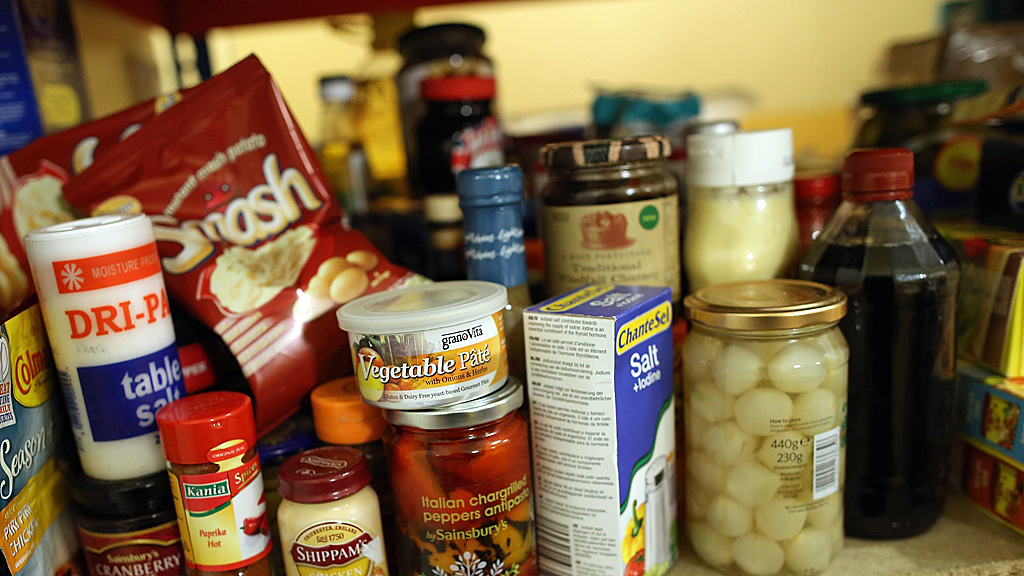Malnutrition a public health emergency, experts warn
Malnutrition is something most of us associate with the third world or even the world of Dickens. But new figures show hospital admissions in England have nearly doubled in the last five years.

A group of scientists and public health experts is warning the rise is evidence of a “public health emergency” which could be linked to changes to benefits.
They cite government statistics that show there were 5,500 hospital admissions for malnutrition between 2012 and 2013 compared to just over 3,000 in 2008.
They also point to a report by the Institute for Fiscal Studies that found families were buying cheaper more unhealthy food.
This has all the signs of a public health emergency that could go unrecognised until it is too late. Letter to the British Medical Journal
In a letter to the British Medical Journal, David Taylor-Robinson from the University of Liverpool and six other academics warn: “This has all the signs of a public health emergency that could go unrecognised until it is too late to take preventive action.”
They say they are particularly worried about the number of children with malnutrition because it can cause cardiovascular and other chronic diseases in adulthood.
They believe the rise in cases of malnutrition, and the increase in the use of food banks, could be linked to welfare reform.
Read more: food poverty on the rise as recession hits home
Rising cost of living
350,000 people have used food banks in the last year according to one charity, the Trussell Trust, that runs 400 such centres in the UK.
Government research on the rise in use of food banks is yet to be published. Dr Taylor-Robinson and his colleagues have criticised the government for the delay.
“We can only speculate that the cause is related to the rising cost of living and increasingly austere welfare reforms.”
They call for urgent monitoring of the effects of the policies on the most vulnerable in society, concluding: “Access to an adequate food supply is the most basic of human needs and rights.”
Read more: government must act to ensure sustainable food supply
Improving the lives of the poorest
The government says the report into food banks has to be “peer-reviewed” before it is published, but has dismissed any link between the rise in food poverty and the changes to the benefits system.
A spokesperson for the Department for Work and Pensions said:
“The government has taken action to help families with the cost of living, including increasing the tax-free personal allowance to £10,000 which will save a typical taxpayer over £700, freezing council tax for five years and freezing fuel duty.
There is no robust evidence that welfre reforms are linked to incresed use of food banks. Department for Work and Pensions spokesperson
“The benefits system supports millions of people who are on low incomes or unemployed, and there is no robust evidence that welfare reforms are linked to increased use of food banks.
“In fact, our welfare reforms will improve the lives of some of the poorest families in our communities, with the universal credit making 3 million households better off – the majority of these from the bottom two-fifths of the income scale.”
But the executive chair of the Trussell Trust, Chris Mould, told Channel 4 News the government had refused numerous requests from him for meetings to discuss the rise in use of food banks.
“We are really pleased that public health professionals have thrown a spotlight on a serious issue that our food banks see day in day out.
We all want to know what the results of the government’s research is, and hope it will provide a useful steer to policy makers in their response to the growing problem of food poverty in the UK” he said.
Text of letter to the BMJ
"The number of malnutrition related admissions to hospital in England has doubled since 2008-09.
"Furthermore, the Institute for Fiscal Studies has reported a decrease in calories purchased and substitution with unhealthier foods, especially in families with young children. Against a backdrop of rising food prices, figures from the Trussell Trust show an exponential rise in the number of people being issued food bank vouchers by frontline care professionals.
"This has all the signs of a public health emergency that could go unrecognised until it is too late to take preventive action.
"Because the government has delayed the publication of research it commissioned into the rise in emergency food aid in the UK,
we can only speculate that the cause is related to the rising cost of living and increasingly austere welfare reforms.
"The effects of these policies on nutritional status in the most vulnerable populations urgently need to be monitored. Malnutrition in children is particularly worrying because exposures during sensitive periods can have lifelong effects, increasing the risk of cardiovascular and other adult chronic diseases.
"Access to an adequate food supply is the most basic of human needs and rights. We should not allow food poverty in the UK to be the next public health emergency."
The letter was signed by David Taylor-Robinson, a health scientist at the Medical Research Council, and colleagues from the department of public health and policy at the University of Liverpool, University College London's Institute of Child Health, and the public health department at Blackburn with Darwen borough council.